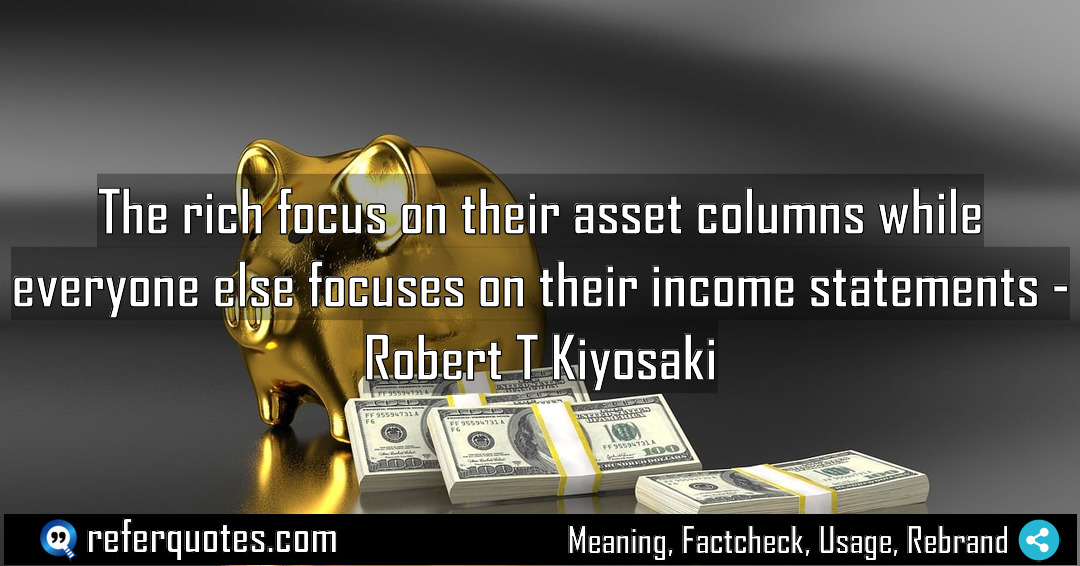“The rich focus on their asset columns…” is a powerful distinction between how the wealthy and the middle class approach their finances. It’s not just about earning more; it’s about building a self-sustaining engine of wealth.
Share Image Quote:Table of Contents
Meaning
At its core, this quote means that the wealthy prioritize acquiring things that put money into their pockets (assets), while others are primarily concerned with the money coming in from their job (income) and then going right back out on expenses.
Explanation
Let me break this down because it’s a concept I’ve seen play out again and again. Most people, when they get a raise, immediately increase their spending—a bigger house, a nicer car. Their lifestyle inflates right along with their income statement. They’re trapped on what I call the Earn-Spend Treadmill.
The rich do something fundamentally different. They use their income to buy assets—things like cash-flowing real estate, dividend stocks, intellectual property, or a business that doesn’t require their direct presence. The goal isn’t to have a bigger paycheck to spend, but to have their asset column generate enough passive income to cover their life. That’s the escape hatch. That’s financial freedom. It’s a shift from being a passenger in your financial life to being the architect.
Quote Summary
| Context | Attributes |
|---|---|
| Original Language | English (4111) |
| Category | Wealth (122) |
| Topics | assets (8), income (12) |
| Literary Style | analytical (123), clear (354), educational (37) |
| Emotion / Mood | rational (71) |
| Overall Quote Score | 78 (185) |
Origin & Factcheck
This quote comes directly from Robert T. Kiyosaki’s 1997 personal finance classic, Rich Dad Poor Dad. The book, which originated in the United States, is built on the contrasting financial philosophies of his two “dads”—his highly educated but financially struggling real father (Poor Dad) and the entrepreneurial father of his best friend (Rich Dad). It’s important to note that Kiyosaki has stated the “Rich Dad” character is a composite, a storytelling device to illustrate his principles, which has led to some debate about the literal truth of the anecdotes.
Attribution Summary
| Context | Attributes |
|---|---|
| Author | Robert T Kiyosaki (152) |
| Source Type | Book (4593) |
| Source/Book Name | Rich Dad Poor Dad (43) |
| Origin Timeperiod | Contemporary (1734) |
| Original Language | English (4111) |
| Authenticity | Verified (4593) |
Author Bio
Born in Hilo, Hawaii, Robert T. Kiyosaki graduated from the United States Merchant Marine Academy and served as a Marine Corps helicopter gunship pilot in Vietnam. After stints at Xerox and entrepreneurial ventures, he turned to financial education, co-authoring Rich Dad Poor Dad in 1997 and launching the Rich Dad brand. He invests in real estate and commodities and hosts the Rich Dad Radio Show. The Robert T. Kiyosaki book list spans personal finance classics like Cashflow Quadrant and Rich Dad’s Guide to Investing, along with educational games and seminars.
| Official Website | Facebook | X| Instagram | YouTube
Where is this quotation located?
| Quotation | The rich focus on their asset columns while everyone else focuses on their income statements |
| Book Details | Publication Year/Date: 1997; ISBN/Unique Identifier: 978-1612680194; Last edition: 2022 Revised Edition, Number of pages: 336 |
| Where is it? | Chapter 3: Why Teach Financial Literacy, Approximate page from 2022 edition: 70 |
